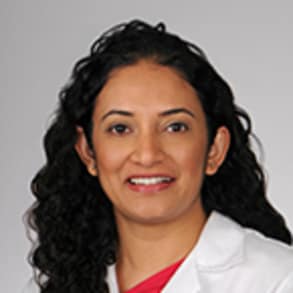Thanks to improved treatments, patients with cancer are living longer. Some of those treatments, however, are associated with cardiotoxicities that can put patients at risk for heart problems, such as heart failure, difficult-to-control blood pressure, coronary artery disease and arrhythmias. The goal of the Cardio-Oncology Program at MUSC Health, co-directed by Bhavadharini Ramu, M.D. and Marian H. Taylor, M.D., is to protect patients’ hearts before, during and after cancer treatments.
BHAVADHARINI RAMU: Cancer treatments have come a long way. They're very helpful in treating cancers now. And more and more patients are living now free of cancer as having been through these treatments. But many of them come with cardiac toxicity. For instance, radiation, which especially if it's given to the chest for certain cancers like lymphoma or breast cancers. And if it was part of the field where the heart is, it can affect the heart and cause several problems including coronary artery disease. This is typically very calcific coronary disease, and it was the proximal vessels and was the left main artery, it can cause calcific aortic and mitral valve disease. It can cause-- affect the pericardium, which is the outer layer of the heart. It can also affect the heart muscle itself and cause a cardiomyopathy. Now, these changes from radiation happen many, many years after radiation exposure, sometimes as late as 15, 20, 25 years later. There are also cancer drugs that we use-- chemotherapeutic drugs, some of which are known to cause heart problems. This includes drugs like adriamycin, cyclophosphamide, which have been around for a long time. There are also newer drugs-- certain immunotherapeutic drugs and so on, which also have specific cardiac toxicities, and these can vary from congestive heart failure to very difficult to control hypertension to arrhythmias to pulmonary hypertension, and so on. So a cardiac oncology program is a multi-disciplinary program which involves close collaboration of multiple specialists all of whom are working together with the focus of achieving long-term survivorship of cancer patients. You're not just trying to treat a cancer patient through the cancer, but you're kind of continuing to follow them and see how they do over time, monitoring them for toxicities that they can develop and ensuring a quality of life. This typically involves the patient's treating oncologist. It involves a cardiologist, and these cardiologists have expertise in imaging or advanced heart failure and cardiac surgeons. There are nurses, nurse practitioners, all part of a team, all of whom are focused on how best to manage each particular patient with an individualized plan so that they can have the best outcome. The cardiac oncology program's goal is to minimize any heart damage that patients can develop as a result of cancer treatments. Patients can also have preexisting cardiovascular disease or risk factors for cardiovascular disease. They may not even know they have heart disease prior to going through cancer treatments. So our goal is to screen patients with specific imaging modalities that we have, and make sure that if there are any risk factors for heart disease-- this can be poorly controlled hypertension, diabetes, it can be coronary disease or known cardiac disease-- we want to optimize it as much as possible before they go through cancer treatments, so that they have the best outcome. And for this, we use specific imaging modalities, echocardiogram with some advanced skills like strain imaging, 3D echo, biplane EF, and so on. We also use PET scans. We use MRIs, and-- which are very helpful in early diagnosis of cardiac toxicity, even before patients develop symptoms. If patients develop symptoms or with these modalities, If we identify early signs of cardiac toxicity, we then focus on how can we make these better? These can be with medications if they develop congestive heart failure. It can be with stents if they develop coronary disease or just with medications. They can need procedures such as pacemakers or so on. Very rarely, they may need surgeries. And if with heart failure, they don't improve with medications, we also have opportunities for advanced heart failure therapies, including a heart pump, a heart transplant here. This is a new field. This is an evolving field. And it is exciting that we have the opportunities that we do now to take care of these patients. Physicians just need to know that patients can develop problems from cancers or cancer treatments that affect the heart many, many years after their exposure. And they just need to be aware that if there's ever any question, ever any concern, if they just need advice or a consultation, the team here at MUSC is happy to provide it in a timely manner.
Related Presenters
